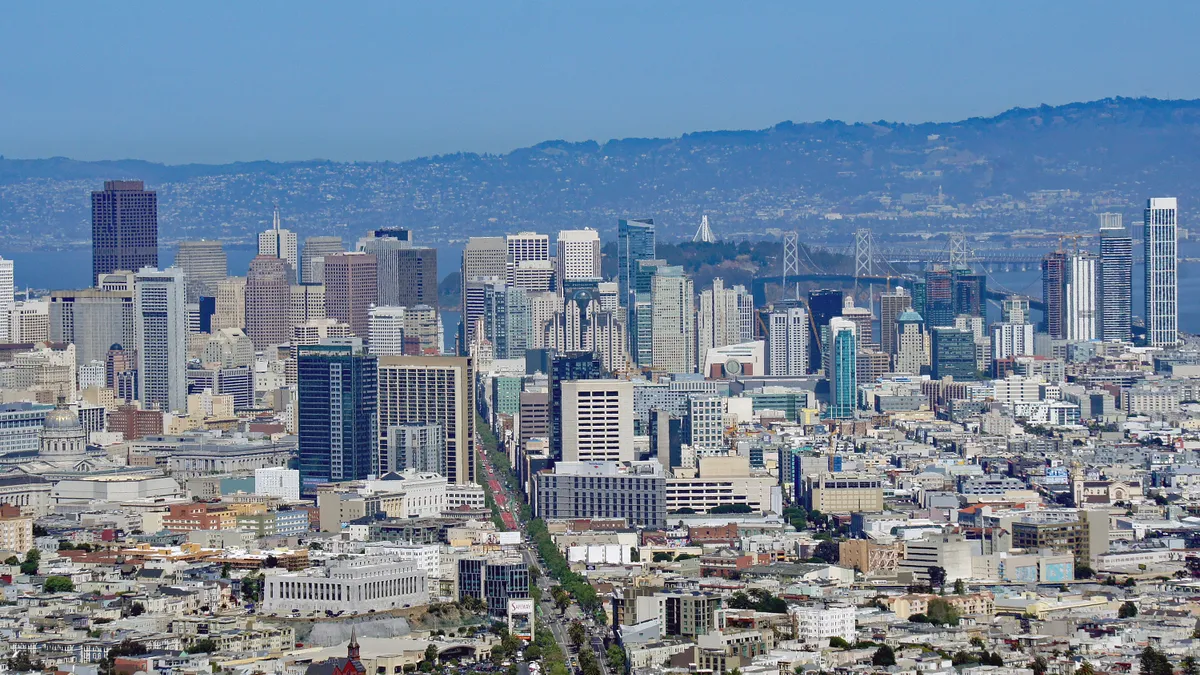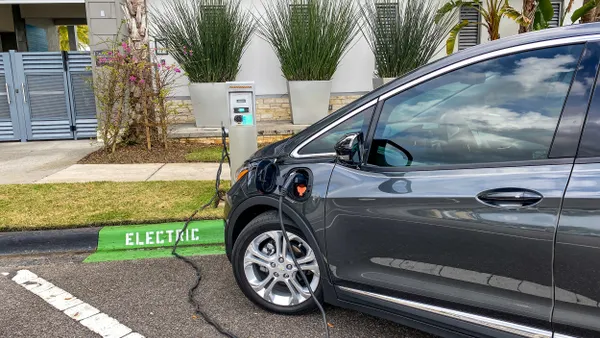Dive Brief:
- San Francisco could be the latest to implement congestion pricing after the San Francisco County Transportation Authority (SFCTA) kicked off a study period on a new tolling scheme.
- SFCTA said it is looking into charging a fee to drive into downtown San Francisco or its South of Market (SoMa) neighborhood. SFCTA says the study will aim "to understand whether congestion pricing could be an effective and fair tool to reduce congestion," and will explore this in addition to discounts and subsidies for transit, biking and walking.
- SFCTA also pledged to make any congestion pricing equitable by ensuring that vulnerable communities do not pay a "proportionally larger share of their income," while at the same time using revenues raised to prioritize transit and fight climate change. "In addition to using pricing revenue to pay for sustainable transportation modes, we can develop programs that specifically help disadvantaged travelers," SFCTA wrote.
Dive Insight:
San Francisco could be considered something of a leader in the U.S. on congestion pricing for its past actions, where it studied proposals on two separate occasions in 2008 and 2010 but backed away both times. Since then, New York City has taken up that leadership mantle by approving a congestion pricing plan, while Seattle and Los Angeles are at various stages of studying its feasibility.
Based on the public pronouncements of some of those involved in San Francisco's latest study, the emphasis on equity will be key. In a tweet, Tiffany Chu, co-founder of transportation planning software Remix and a member of SFCTA's policy advisory committee, shared that there will be a new decision-making process including "accountability to equity." This means any member can flag any item related to congestion pricing for further discussion if they feel it puts that equity goal in jeopardy.
So...San Francisco is exploring congestion pricing again! Last study was in 2010 / didn’t move fwd due to recession ????. I’m on the Policy Advisory Committee + @sfcta kicked it off tonight with a new decision making process, which includes accountability to equity. pic.twitter.com/TIgabjm0kr
— tiffany chu (@tchu88) November 22, 2019
The role of equity in congestion pricing is one that bedevils city leaders, as they are keen to ensure low-income drivers are not disproportionally affected. There are various theories on how to achieve this; in Seattle, an Uber-commissioned white paper suggested using some of the revenue generated for a "mobility fairness program" to provide rebates and toll credits to low-income households.
There are other theories around exempting some drivers entirely, but a key way to encourage equity is to use accrued tolling revenue to help benefit public transit. London took money it raised from congestion pricing to invest heavily in its bus and underground rail service, and it appears that Los Angeles would want to do the same. At the CoMotion LA conference in November, LA Metro CEO Phil Washington said congestion pricing could pay for free transit, which could greatly enhance that equity piece.
"We know that if we have congestion pricing there's going to be a smoother flow of traffic and we know all these things, but free transit in the area and taking that burden away from families in terms of the expense of transportation could mean the difference between affordable housing, it could impact homelessness, it puts money back into families' pockets," Washington said in a speech.
In San Francisco, congestion pricing would be the latest step in its efforts to reduce the number of cars on downtown streets. In October, the San Francisco Municipal Transportation Agency (SFMTA) Board of Directors voted unanimously to approve the Better Market Street plan, which bans cars along the downtown strip of Market Street.












